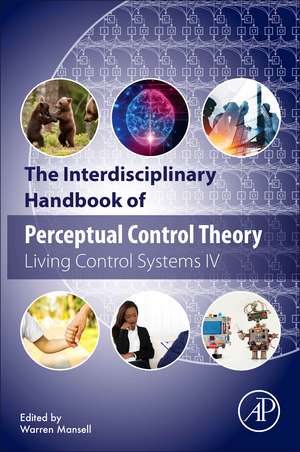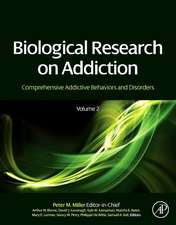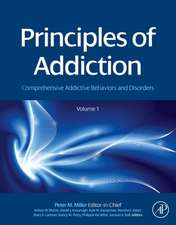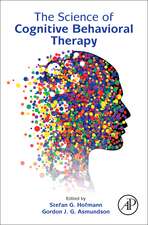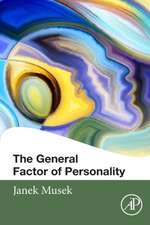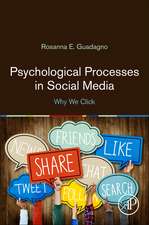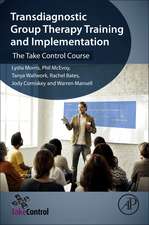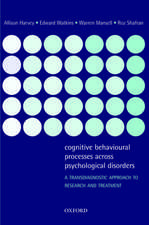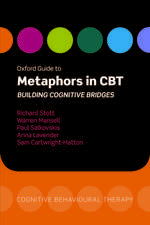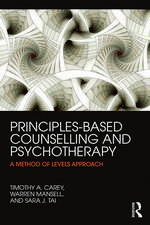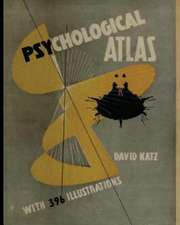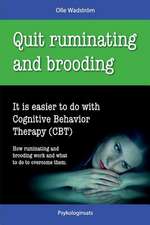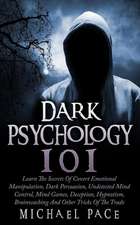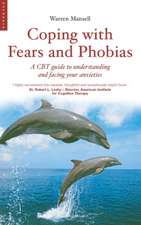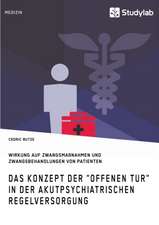The Interdisciplinary Handbook of Perceptual Control Theory: Living Control Systems IV
Editat de Warren Mansellen Limba Engleză Paperback – 21 mai 2020
Each chapter includes an author biography to set the context of their work within the development of PCT.
- Presents case studies that show how PCT can be applied in different disciplines
- Illustrates the Test for the Controlled Variable (TCV) and the construction of functional models as fruitful alternatives to mainstream experimental design when studying behavior
- Shows how theory illuminates structure and functions in brain anatomy
- Compares and contrasts PCT with other contemporary, interdisciplinary theories
Preț: 1108.51 lei
Preț vechi: 1342.43 lei
-17% Nou
Puncte Express: 1663
Preț estimativ în valută:
212.12€ • 226.82$ • 176.86£
212.12€ • 226.82$ • 176.86£
Carte tipărită la comandă
Livrare economică 11-25 aprilie
Preluare comenzi: 021 569.72.76
Specificații
ISBN-13: 9780128189481
ISBN-10: 0128189487
Pagini: 680
Ilustrații: Approx. 150 illustrations
Dimensiuni: 152 x 229 x 39 mm
Greutate: 10.9 kg
Editura: ELSEVIER SCIENCE
ISBN-10: 0128189487
Pagini: 680
Ilustrații: Approx. 150 illustrations
Dimensiuni: 152 x 229 x 39 mm
Greutate: 10.9 kg
Editura: ELSEVIER SCIENCE
Public țintă
Researchers and students in psychology, neuroscience, engineering, sociology, ethology, computer science, evolutionary biology, linguistics, robotics, and artificial intelligenceCuprins
Part I
Why do we need perceptual control theory?
1. The world according to PCT
2. Understanding purposeful systems: the application
of control theory in engineering and psychology
3. The crisis in neuroscience
4. When causation does not imply correlation: robust
violations of the faithfulness axiom
Part II
Models of brain and behavior
5. Unraveling the dynamics of dyadic interactions:
perceptual control in animal contests
6. How the brain gets a roaring campfire: Structuring
for Perceptual Results
7. How the brain gets a roaring campfire: input and
output functions
8. The phylogeny, ontogeny, causation and function of
regression periods explained by reorganizations of the
hierarchy of perceptual control systems
Part III
Collective control and communication
9. Social structure and control: perceptual control theory
and the science of sociology
10. Perceptual control in cooperative interaction
11. Language and thought as control of perception
Part IV
Applications
12. Perceptions of control theory in
industrial-organizational psychology: disturbances
and counter-disturbances
13. Method of Levels Therapy
14. Robotics in the real world: the perceptual control
theory approach
15. PCT and beyond: toward a computational framework
for ‘intelligent’ communicative systems
Part V
Synthesis
16. Ten vital elements of perceptual control theory,
tracing the pathway from implicit influence to
scientific advance
Why do we need perceptual control theory?
1. The world according to PCT
2. Understanding purposeful systems: the application
of control theory in engineering and psychology
3. The crisis in neuroscience
4. When causation does not imply correlation: robust
violations of the faithfulness axiom
Part II
Models of brain and behavior
5. Unraveling the dynamics of dyadic interactions:
perceptual control in animal contests
6. How the brain gets a roaring campfire: Structuring
for Perceptual Results
7. How the brain gets a roaring campfire: input and
output functions
8. The phylogeny, ontogeny, causation and function of
regression periods explained by reorganizations of the
hierarchy of perceptual control systems
Part III
Collective control and communication
9. Social structure and control: perceptual control theory
and the science of sociology
10. Perceptual control in cooperative interaction
11. Language and thought as control of perception
Part IV
Applications
12. Perceptions of control theory in
industrial-organizational psychology: disturbances
and counter-disturbances
13. Method of Levels Therapy
14. Robotics in the real world: the perceptual control
theory approach
15. PCT and beyond: toward a computational framework
for ‘intelligent’ communicative systems
Part V
Synthesis
16. Ten vital elements of perceptual control theory,
tracing the pathway from implicit influence to
scientific advance
Recenzii
"This is a marvelous book. It serves as a tribute to Bill Powers, as the father of PCT (now grandfather, as he himself says), and as a comprehensive overview of the history, theory and application of PCT within the social and natural sciences. The subject range is vast, from neurodynamics to organizational psychology, from animal contests to psychotherapy, with each chapter beautifully judged in terms of coverage and detail. The Interdisciplinary Handbook of Perceptual Control Theory thus makes the strongest possible case for PCT as both a unifying theory within psychology, and a bridge to other disciplines. Everyone involved in its production should be congratulated, and everyone else should read it." --Louise Barrett, FRSC, Professor of Psychology, Canada Research Chair in Cognition, Evolution and Behaviour, Department of Psychology, University of Lethbridge, Alberta, Canada
"More than a century after John Dewey's insight that the response is not merely to the stimulus but it is into it, William Powers' community continues to challenge the "central dogma" of behavioral neuroscience: stimulus, then processing and, finally, response. While defining behavior as output is a form of covert anthropomorphism, conceiving behavior as control of perception better respects the nature of life and mind." --Alex Gomez-Marin, Principal Investigator, Behaviour of Organisms Laboratory Cellular and Systems Neurobiology Unit Instituto de Neurociencias CSIC-UMH, Alicante, Spain
"Perceptual control theory is a fascinating, complex, and profoundly fertile understanding of human being that combines scientific rigour with a deeply humanistic ethos. This interdisciplinary handbook is a much needed resource which pulls together contemporary thinking and research in the field. Ranging from robotics to neuroscience to psychotherapy, the book will be of great value to those who want to deepen their understanding of this unique approach and apply its insight to the fields of psychological and social practices." --Mick Cooper, Professor of Counselling Psychology, Department of Psychology, University of Roehampton, London, UK
"This powerful volume is the amplifying extension of Bill Powers’ legacy that the academic world has long needed. While other, more popular psychological theories have foundered in the much discussed "replication crisis", this collection of dogged researchers, and others like them, have quietly and persistently been piling up increasing evidence of the profound explanatory power nestled within the elegant simplicity of PCT. Skillfully curated by editor, Mansell, the rigour of their revolutionary work across a wide spectrum of fields within the biological and social sciences stands as compelling evidence that PCT is no longer simply an idea whose "time has come", but is, rather, a powerful field of application that has well and truly "arrived"." --Tom Scholte, Professor, Department of Theatre and Film, The University of British Columbia
"More than a century after John Dewey's insight that the response is not merely to the stimulus but it is into it, William Powers' community continues to challenge the "central dogma" of behavioral neuroscience: stimulus, then processing and, finally, response. While defining behavior as output is a form of covert anthropomorphism, conceiving behavior as control of perception better respects the nature of life and mind." --Alex Gomez-Marin, Principal Investigator, Behaviour of Organisms Laboratory Cellular and Systems Neurobiology Unit Instituto de Neurociencias CSIC-UMH, Alicante, Spain
"Perceptual control theory is a fascinating, complex, and profoundly fertile understanding of human being that combines scientific rigour with a deeply humanistic ethos. This interdisciplinary handbook is a much needed resource which pulls together contemporary thinking and research in the field. Ranging from robotics to neuroscience to psychotherapy, the book will be of great value to those who want to deepen their understanding of this unique approach and apply its insight to the fields of psychological and social practices." --Mick Cooper, Professor of Counselling Psychology, Department of Psychology, University of Roehampton, London, UK
"This powerful volume is the amplifying extension of Bill Powers’ legacy that the academic world has long needed. While other, more popular psychological theories have foundered in the much discussed "replication crisis", this collection of dogged researchers, and others like them, have quietly and persistently been piling up increasing evidence of the profound explanatory power nestled within the elegant simplicity of PCT. Skillfully curated by editor, Mansell, the rigour of their revolutionary work across a wide spectrum of fields within the biological and social sciences stands as compelling evidence that PCT is no longer simply an idea whose "time has come", but is, rather, a powerful field of application that has well and truly "arrived"." --Tom Scholte, Professor, Department of Theatre and Film, The University of British Columbia
